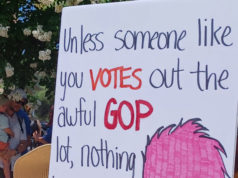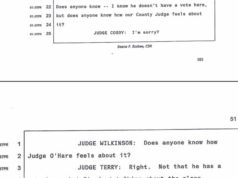Mayor Mike Moncrief never talks to Static’s colleagues here at the Weekly, so when he opens up to our broadcast media sistren, we gather ’round the electronic devices like oracle-seekers at Delphi.
Two weeks ago, Moncrief appeared on KERA’s radio and tv show Think, hosted by Krys Boyd. In 20 minutes of mayoral yakking, we learned that 1) Mike was somewhat nervous during his recent parachute jump; 2) Fort Worth folks need to use public transit more, but no, the mayor doesn’t; and 3) senior citizens have “paid their dues” and deserve the recently passed tax freeze. Pretty mundane stuff. But then Mike dropped a real head-scratcher of a line. He said that activity in the Barnett Shale gas field “is estimated to be around for the next 50 years.” That’s odd, because in championing the idea of socking away the city’s expected billion or so dollars in gas well profits for our kids and grandkids (rather than spending it on needed projects now), the mayor’s reasoning has always been that the field won’t last more than 15 or 20 years — a very short play, as they say. Well, you might want to throw a few “greats” onto that list of future generations that will benefit.
Dan Steward, a consultant for Dallas-based Republic Energy, thinks Moncrief’s estimate might not go far enough. Steward, whose book, The Barnett Shale Play, was published in April by the Fort Worth Geological Society, told Static, “I’d say the Barnett Shale gas-producing wells will be around 100 years from now.” And he added, even that estimate “is on the conservative side.” Steward said that what’s been found thus far in drilling, plus recent technological improvements, are pushing estimates way out past initial expectations. The revenues do decline over time — more gas is produced during the early years of a well. Such estimates have a real bearing on the city’s decisions about what to do with the gas money. If the revenue stream is going to last only 15 to 20 years, then the endowment fund makes sense in some ways: Take that short-term windfall and invest it for future, unknown needs. But if the “windfall” is going to last 50 to 100 years, then finding and addressing current needs seems to be a more prudent use, both economically and politically. We don’t know if the mayor has changed his thinking on the spend-or-save issue (shockingly, he didn’t return Static’s calls). But the real question is, where did he get that 50-year figure? For several years now, he’s been telling Fort Worth citizens that they’ll need to put up with the noise, pollution and huge water usage of the gas wells for only a couple of decades in order to reap those billions. But what happens when all those problems become a semi-permanent fixture of our landscape? Is it worth it then? Static isn’t sure it likes its mythical great-great-grandbrats that much.










